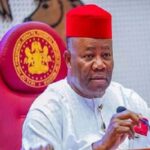
This, it said is aimed at creating 17.5 million jobs and supporting 100,000 farmers nationwide.
The first phase, which now runs in Kano, Kaduna, Kwara, Ogun, Oyo, Imo, Cross River and the Federal Capital Territory, will gulp over $520m and is set to conclude by 2028.
Also, 26 states have expressed interest in joining Phase II of the programme, where the $1bn funding from the AfDB and other partners will be channeled.
The states will begin documentation for the second phase in early 2024.
The Minister of Agriculture and Food Security, Abubakar Kyari, disclosed this to State House correspondents at the end of the National Economic Council meeting presided over by Vice President Kashim Shettima at the Presidential Villa, Abuja, on Thursday.
Kyari said the funds are earlier pledges by the African Development Bank, Islamic Development Bank and the International Fund for Agricultural Development, who voted $1bn to deliver SAPZs in 24 states at the Norman Borlaug International Dialogue, World Food Prize 202, in Des Moines, Iowa, USA, in late October.
This is aside from an initial $520m voted by the development partners for the same purpose.
“The Vice President who attended the World Food Prize in Des Moines, Iowa, met with the President of the African Development Bank. Dr. Adesina who has already pledged $1bn to the second phase,” said the minister.
He noted that his ministry made a presentation to the council outlining the collaborative programme with the African Development Bank, the International Fund for Agricultural Development, the Islamic Development Bank, various state governments, and private investors.
He explained, “The seven states are Kano, Kaduna, Kwara, Ogun, Oyo, Imo and Cross River and like I said, with the FCT being the eighth partner in this programme.
“The quick wins here are that even in the stage of construction, you will have the opportunity for over 3,000 jobs.
“And at the end of the construction, opportunities will be for almost 500,000 jobs on each zone that is for each state and then also to support about 100,000 farmers.”
The minister described the SAPZs as a cross-cutting initiative and platform to attract private sector investment, add value to Nigeria’s agro-processing, and unlock opportunities for improved food security and job creation.
He revealed further that the programme, which commenced in 2022, saw the active participation of seven states and the Federal Capital Territory, even as the zones will not only serve as production sites “but also hubs for aggregation and processing of agricultural produce.”
The programme has earmarked approximately $530m for the first phase, aiming to establish clusters of agricultural production and significantly reduce post-harvest losses, the former lawmaker noted.
“For instance, Kano has keyed in to do a lot of tomatoes in this zone. And we know that tomato losses run to almost 50 to 60 percent. It is unacceptable in today’s agricultural sector,” the minister pointed out.
On Phase II, Kyari said, “We have already received expressions of interest from about 26 states so far. The second phase is supposed to kick in next year. This first phase will last for five years. And the documentation for Phase Two will begin by next year.
“There are only three states (Abia, Adamawa and Yobe) that have not expressed interest. But as we were leaving here, one (Abia State) had already signified and are working on sending the expression of interest.”
The council also acknowledged the leading role of Ogun State in the development of these zones.
Kyari said despite the state’s delay in signing the Subsidiary Loan Agreement, a commitment was recently secured from the state government to sign it promptly.
To further expedite the initiative, the council approved “the accelerated transmission of the official documents to funders by the Federal Ministry of Finance” and granted a waiver from the same ministry for the payment of performance allowance to project staff by the funders as requested by the executing agency to “avoid project implementation risks.”
The NEC called for “a lot of enthusiasm from state governors to participate and key into” the project, which it said will drive significant economic growth through job creation and modernised agricultural practices.





